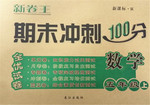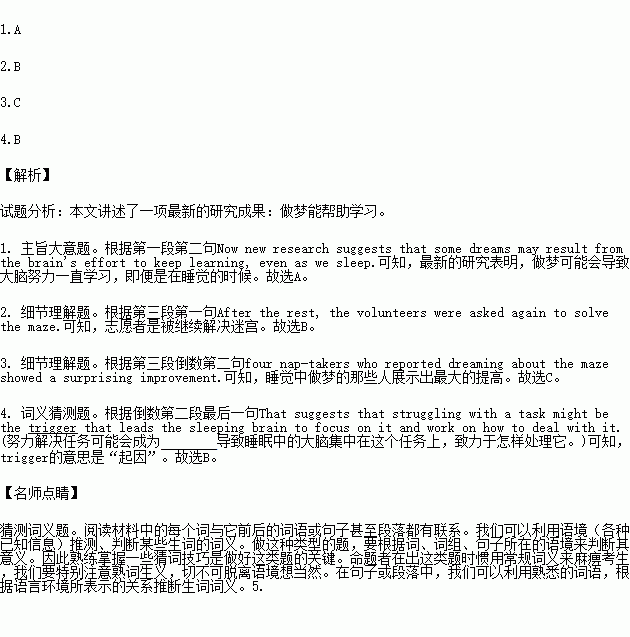题目内容
Why do we dream?It's a question researchers have been studying for years. Now new research suggests that some dreams may result from the brain's effort to keep learning, even as we sleep.
In a study in Boston, 100 volunteers were trained for an hour on a maze (迷宫).They tried to find their way through the difficult puzzle as quickly as possible. Then half of the volunteers were allowed to sleep for 90 minutes. The other half stayed awake, reading or relaxing. The ones who slept were asked to describe their dreams when they woke up.
After the rest, the volunteers were asked again to solve the maze. Those who hadn't slept showed no improvement or did even worse after the break. Sleepers who didn't report any maze related dreams did better but showed only a little improvement. However, four nap-takers who reported dreaming about the maze showed a surprising improvement. They scored 10 times higher after sleeping and dreaming about the maze.
Even though the number of dreamers was small, the researchers noted that the gap in learning between the dreamers and non-dreamers was so wide that the finding was significant (有意义的).
The dreamers had all performed poorly on the test before dreaming about it. That suggests that struggling with a task might be the trigger that leads the sleeping brain to focus on it and work on how to deal with it.
“It's almost as if your brain is going through everything that happened today,”Dr Stickgold,a scientist at Harvard Medical School, said. “The things you're obsessed (迷住) with are the ones that your brain forces you to continue to do with.”
1.What's the best title for this passage?
A.Learning while you dreamB.What dreams stand for
C.Dream a good dreamD.Dreams and health
2.What were the volunteers asked to do after the rest?
A.To work on a new maze.
B.To continue to do the maze.
C.To talk with each other about their dreams.
D.To tell what they thought about the maze.
3.According to the study, which group showed the greatest improvement?
A.Those who didn't sleep.
B.Those who slept but didn't dream.
C.Those who dreamed about the maze while sleeping.
D.Those who thought about the maze before falling asleep.
4.The underlined word “trigger” in Paragraph 5 probably means “________”.
A.chanceB.causeC.wayD.idea
 课程达标测试卷闯关100分系列答案
课程达标测试卷闯关100分系列答案 新卷王期末冲刺100分系列答案
新卷王期末冲刺100分系列答案 全能闯关100分系列答案
全能闯关100分系列答案
